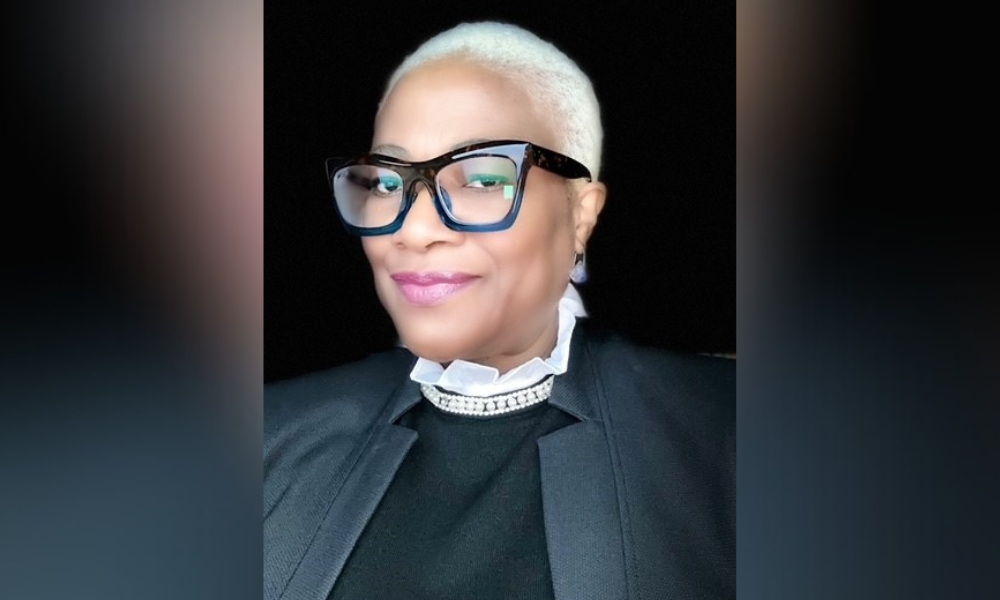Top of mind is over-representation of Black and Indigenous people in criminal justice system

Althea Francis has been promoted to the role of general counsel at Public Prosecution Service of Canada following more than 20 years of dedicated service to the independent government authority.
The first Black woman to earn the prestigious general counsel title at the Ontario regional office of the PPSC, Francis is passionate about taking action against systemic discrimination and racism in the criminal justice system.
“Becoming general counsel, as a Black woman with a family, is an achievement that I’m very proud of because I do have those competing commitments that have helped to ground me,” says Francis. “There is a family behind me and a lived experience, and I’m glad the organization celebrates that by promoting a fairly young, Black woman with a family.”
Top of mind for Francis in her new role is the over-representation of Black and Indigenous people and other marginalized individuals in the criminal justice system. She is focused on recognizing this problem and putting in place tools, policies, procedures and programs to effectively make a change.
“We have been on a journey of recognizing what really is the truth, and the power of our decisions,” says Francis. “We do hold a significant power within the criminal justice system to influence the trajectory of someone’s life and how the overall perception of justice is seen, and we do have to be mindful of our own biases.”
Having worked in the space of equity, diversity and inclusion for many years, Francis is proud that her personal priorities align with those of the PPSC. She has been chairing the organization’s diversity, equity, inclusion and accessibility committee for the Ontario regional office since 2021 when the committee was founded. This involves working with senior leadership regionally and nationally, and running training programs on issues such as unconscious bias, systemic racism, Indigenous relations, and LGBTQ+ pronouns. She also drafted a strategic plan for equity, diversity, inclusion and accessibility for the PPSC’s Ontario regional office which became a blueprint for governance documents around EDI within the office.
Francis was an Innovatio award winner in 2019 for her innovative work around diversity in a law department.
“Working in the space of equity, diversity and inclusion is the most rewarding for me,” says Francis. “It’s about challenging your biases to think and rethink about how you view an accused person and to recognize when you're sentencing an individual that you’re not just sentencing the bad parts of the individual. You’re sentencing the whole person. How do you ensure that when you go to look at a particular case, you’re taking into account the person and their socio-economic status? How do you balance the safety of the community with ensuring that you don’t perpetuate the stereotype?”
Since its inception, PPSC has gone through a revolution in terms of its policies, practices and programs. Francis – who has been with PPSC since her call to the bar in 2001 – has seen the core values of the organization be revamped to include equity and inclusion, and a commitment to truth and reconciliation, in addition to respect, trust, professionalism, and courage.
Francis is also now a member of the PPSC’s National Prosecution Policy Committee, so she hopes to bring her EDI skills and experience to the committee to help develop policies and assist with changes to the Deskbook – an important tool to guide prosecutorial decision-making.
In her new role, Francis provides strategic legal advice on high-profile, national cases including national security and cross-border prosecutions. Working on high-risk projects involves adapting existing frameworks and developing new and innovative strategies and solutions, she says.
“Oftentimes, I’m working in fields where perhaps there is no legal precedent or procedural precedent set, and so you’re pulling from frameworks, arguing by analogy and creating and innovating around providing a solution that’s practical, legally sound, and has national implications,” says Francis.
Francis’ rise to general counsel came after considerable experience in different areas of the organization. Early in her career when PPSC was still part of the Department of Justice, she worked with the Ontario Court of Justice and with the Superior Court of Justice where she honed her skills in sentencing, bail hearings, charter litigation, pre-trial motions, and judicial pre-trials. She also had the opportunity to work as Special Advisor to the Assistant Deputy Attorney General, where she had a bird’s-eye view of the inner workings of the PPSC.
Francis also worked on a major case team called the Integrated Road team, earning the title of senior counsel on the team in 2012. She worked on numerous complex prosecutions before earning the esteemed title of general counsel on August, 1, 2023.
“A general counsel is more than just a lawyer,” says Francis. “You have to be somebody who has an influence on the priorities of the organization, someone whose advice is sought out, and somebody who has engaged in stretch goals. For anyone thinking about becoming a GC, I would encourage them to volunteer and engage in the heartbeat of the organization.”










